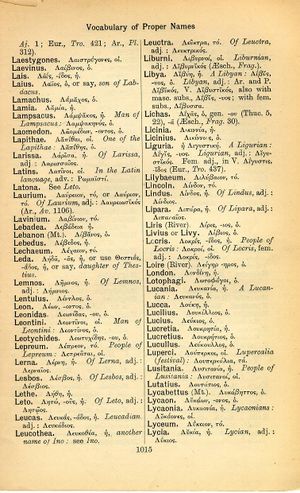Lindus: Difference between revisions
νύμφην τ' ἄνυμφον παρθένον τ' ἀπάρθενον → wife unwed and virgin that is no virgin | bride that is no bride, virgin that is virgin no more | virgin wife and widowed maid | unwed bride and ravished virgin
m (Text replacement - "}}]]" to "}}]]") |
m (Text replacement - "(|thumb)\n(\|link=)" to "$1$2") |
||
| Line 1: | Line 1: | ||
{{WoodhouseENELnames | {{WoodhouseENELnames | ||
|Text=[[File:woodhouse_1015.jpg|thumb | |Text=[[File:woodhouse_1015.jpg|thumb|link={{filepath:woodhouse_1015.jpg}}]][[Λίνδος]], ἡ. | ||
|link={{filepath:woodhouse_1015.jpg}}]][[Λίνδος]], ἡ. | |||
<b class="b2">Of Lindus</b>, adj.: Λίνδιος. | <b class="b2">Of Lindus</b>, adj.: Λίνδιος. | ||
Revision as of 17:00, 18 May 2020
English > Greek (Woodhouse)
Λίνδος, ἡ.
Of Lindus, adj.: Λίνδιος.
Latin > English (Lewis & Short)
Lindus: (-os), i, f., = Λίνδος,
I a town in the island of Rhodes, founded by Lindus, brother of Ialysus, with a temple of Minerva, now Lindo, Mel. 2, 7, 4; Plin. 5, 31, 36, § 132; Cic. N. D. 3, 21, 54.—Hence,
II Lindĭus, a, um, adj., of or belonging to Lindus, Lindian: Lindia Minerva, Plin. 33, 12, 55, § 155: Chares, id. 34, 7, 18, § 41: Cleobulus, of Lindus, one of the seven wise men, Aus. Sept. Sap. 1, 16.
Latin > French (Gaffiot 2016)
Lindus (-ŏs), ī, f. (Λίνδος), Linde [ville de l’île de Rhodes] : Cic. Nat. 3, 54 ; Mela 2, 101 || -dĭus, a, um, de Linde : Plin. 33, 155 || Lindĭa, titre d’une comédie de Turpilius : Prisc. Metr. Ter. 18.

